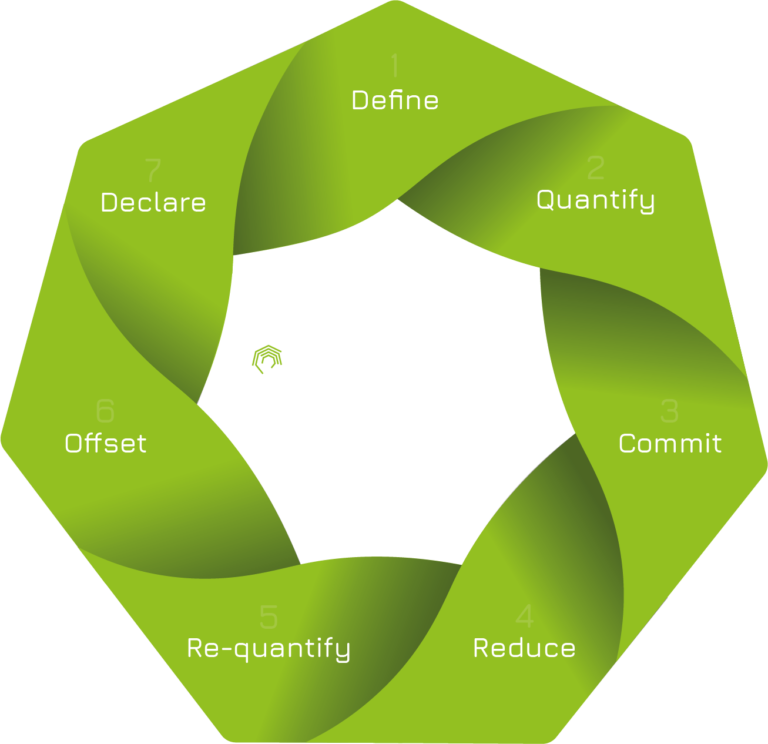Carbon emission reduction lies at the heart of sustainable business practices and is critical for companies aiming to achieve carbon neutrality and comply with ISO standards. With effective carbon reduction strategies in place, businesses can not only reduce their environmental impact but also benefit from cost savings, a competitive advantage, and a strong reputation as an environmentally responsible organisation. Carbonology® combines a wealth of experience in assisting businesses to successfully realise these goals, guiding them in implementing tailored reduction strategies that yield tangible results.
In this informative guide, we will delve into the world of carbon emission reduction, exploring various strategies and the benefits it brings to businesses. Learn how Carbonology®’s expertise can be instrumental in assisting your organisation in achieving sustainable success, carbon neutrality, and ISO standards compliance.
Carbon Emission Reduction: Key Strategies and Elements of Success
1. Energy Efficiency Improvements
Enhancing energy efficiency is a cost-effective and impactful strategy for reducing carbon emissions. Businesses can achieve significant reductions by:
a. Optimising Heating, Ventilation, and Air Conditioning (HVAC): Regular maintenance, upgrading to energy-efficient systems, and implementing smart thermostats can reduce energy consumption and associated emissions.
b. Lighting Upgrades: Switching to LED or compact fluorescent lighting, installing occupancy sensors, and implementing daylight harvesting save energy while maintaining adequate lighting levels.
c. Equipment and Appliances: Investing in Energy Star-rated equipment and appliances reduces energy consumption without compromising functionality (source: https://www.energystar.gov/).
d. Building Design and Insulation: Optimised building design and insulation materials can reduce energy loss and maintain comfortable temperatures, lowering energy demand.
Carbonology® can support businesses in identifying and implementing energy efficiency measures tailored to their specific needs and industry standards.
2. Renewable Energy Integration
Integrating renewable energy into a company’s energy mix serves as an essential strategy for reducing carbon emissions:
a. On-site Renewable Energy Generation: Installing solar panels, wind turbines, or other renewable energy systems on company premises can displace fossil fuel-based electricity consumption.
b. Renewable Energy Purchasing: Businesses can purchase renewable energy from the grid, either directly through Renewable Energy Certificates (RECs) or by participating in green tariff schemes.
c. Power Purchase Agreements (PPAs): Long-term contracts with renewable energy producers guarantee a fixed energy price, providing budget stability and supporting the growth of the renewable energy sector.
Carbonology®’s extensive experience can guide businesses in selecting the most suitable renewable energy integration pathway, balancing cost-effectiveness and sustainability.
3. Waste Reduction and Resource Management
Implementing effective waste reduction and resource management strategies can also contribute to carbon emission reduction:
a. Reduce, Reuse, Recycle: Following the waste hierarchy principles, businesses can minimise waste generation, find ways to reuse materials, and promote recycling to reduce waste-related emissions.
b. Sustainable Procurement: Opting for suppliers that adopt sustainable practices and have low environmental footprints can contribute to effective waste management and lower indirect emissions.
c. Circular Economy Principles: Implementing product life extension, designing for disassembly, and promoting a closed-loop system can reduce emissions and waste, whilst creating new value streams.
Carbonology® can advise on waste reduction and resource management measures that align with business objectives and environmental goals.
4. Green Transportation and Mobility
Green transportation initiatives can significantly reduce carbon emissions produced by business-related travel:
a. Fleet Upgrades: Transitioning to electric or hybrid vehicles and optimising freight logistics can reduce fuel consumption and associated emissions.
b. Sustainable Commuting: Encourage employees to use public transport, carpooling, cycling, or walking, or provide incentives for electric vehicle usage to minimise commuting emissions.
c. Telecommuting and Videoconferencing: Promoting remote work and virtual meetings where possible can reduce business travel and carbon emissions.
Carbonology® can support businesses in the planning and implementation of green transportation measures that help achieve comprehensive carbon emission reduction.
5. Carbon Offsetting and Carbon Capture Solutions
While complete elimination of carbon emissions may not be feasible, businesses can implement carbon offsetting and carbon capture mechanisms as complementing strategies:
a. Carbon Offsetting Projects: Investing in certified carbon offset projects, such as afforestation or clean energy initiatives, can compensate for unavoidable emissions.
b. Carbon Capture and Storage (CCS): Incorporating CCS technology at point-source emission locations enables businesses to capture CO2 before it enters the atmosphere, storing it long-term in underground reservoirs.
Carbonology® can help determine suitable carbon offsetting and carbon capture solutions that align with a business’s carbon reduction goals and corporate social responsibility objectives.
The Bottom Line: Benefits of Carbon Emission Reduction
Adopting carbon emission reduction strategies can unlock numerous benefits for businesses, including:
– Cost Savings: Energy efficiency improvements, waste reduction, and resource optimisation can reduce operational costs.
– Reputation Enhancement: Demonstrating a commitment to reducing carbon emissions can strengthen a company’s image as a sustainable and responsible business.
– Compliance and Risk Mitigation: Effective carbon reduction strategies support compliance with regulatory requirements and reduce the risk of potential future carbon-related penalties.
– Access to Sustainable Finance: Companies with a proven track record of carbon emission reduction may attract sustainable investments, grants, and other financial benefits.
Partnering with Carbonology® can ensure the successful implementation of tailored carbon reduction strategies, driving businesses towards a more sustainable, eco-friendly future.
Embrace a Greener Future with Carbonology®
In conclusion, effective carbon emission reduction is paramount in achieving sustainable business operations, carbon neutrality, and compliance with ISO standards. By implementing energy efficiency improvements, renewable energy integration, waste reduction, green transportation, carbon offsetting, and carbon capture mechanisms, companies can benefit from cost savings, an enhanced reputation, risk mitigation, and access to sustainable finance.
Carbonology®’s wealth of experience in guiding businesses towards carbon neutrality and ISO standards compliance provides invaluable support in the successful design and implementation of tailored carbon reduction strategies. Unlock the full potential of your organisation’s sustainable transition with the expert assistance of Carbonology®. Take a step towards a brighter, greener future by getting in touch with Carbonology® today and discover how their services can accelerate your journey towards remarkable environmental achievements, a strong reputation, and long-lasting success. Contact us to learn about our carbon consultancy services!

